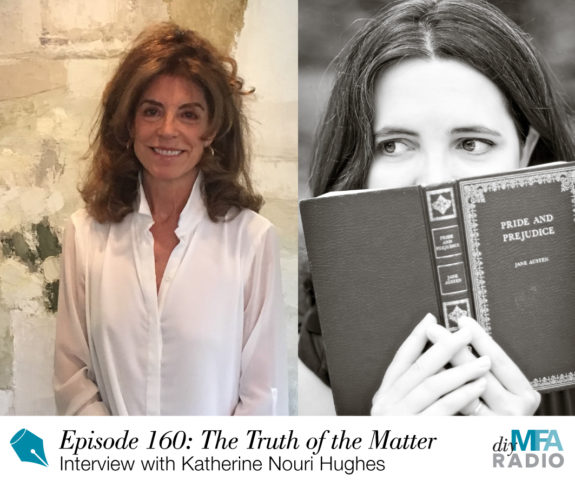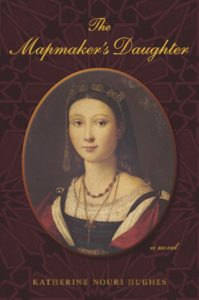Today I am delighted to have debut novelist Katherine Nouri Hughes on the show!
Kate is publishing her debut, The Mapmaker’s Daughter, at the age of 67. Her book is a remarkable feat not only in its scope, but in its depth.
Listen in as we discuss the different and largely unknown (in western culture) historical framework of her novel, and the craft of writing the truth in fiction through your own experiences.
In this episode Katherine and I discuss:
- How to piece together facts of an unknown person in history to create an exciting and believable novel.
- How to reveal the core truth of your story through showing instead of telling.
- How to keep the proportions of your story’s narrative in check.
- Why learning to be calm and relaxed with your novel helps you write better.
- The challenges and advantages are of writing a novel later in life.
Plus, her #1 tip for writers.
Interesting Tidbits
Kate shared a few additional tidbits behind her craft via email after we finished recording and I thought I would share them with you here. Here’s what she said about writing a historical novel and making sure that the language was completely accurate.
I avoided anachronism in a novel set in such a long ago period with 100% reliance on the OED. There is not a word in the book that was not in use in 1583. I figured that way even emotions I described with vocabulary in use at the time might have a better chance of being credible and real.
She also shared something about her process that really hit home and that stuck with me, plus it also ties closely to one of the main themes we discussed in the interview. As a writer, it’s often tempting to tell everyone that we’re working on a novel, and sometimes this full disclosure doesn’t work in our favor. Here’s what Kate had to say about her choice to play her cards close to the vest.
I admit, this is weird, but no one except my immediate family and a couple of very close friends knew that I was writing this book until a few weeks ago when it appeared on Amazon.
I somehow felt the need to keep the process extremely close and protected. I am not sure if this was beneficial or not. It is simply the approach that I took. But it occurs to me that that intense privacy over such a long period of time may have contributed positively to the process, sort of along the lines you and I were discussing… about staying calm and quiet so that awareness can be permitted and cultivated and made use of.
About Katherine Nouri Hughes
Katherine Nouri Hughes, Iraqi-Irish by birth, attended Princeton University where she received a Master’s Degree in Near Eastern Studies and where she serves on that department’s advisory council. She has published two books on k-12 education, was a communications executive in the for-profit and nonprofit sectors, and serves on the boards of the American University in Cairo, the Orpheus Chamber Orchestra and WNET/13, the public television station. She lives in Princeton, New Jersey and has two daughters and two grandchildren. The Mapmaker’s Daughter is her first novel.
The Mapmaker’s Daughter
A woman who wielded extraordinary authority over a vast realm, who influenced the course of astronomy, and who – uniquely among women – upheld an empire’s most important law, has been almost lost to history – until now.
The West has also largely forgotten that for more than a century, during and following the reign of Suleiman the Magnificent, a “sultanate of women,” of slave origin, exerted exceptional political influence over matters of state. This sultanate is currently depicted on the Netflix series, The Magnificent Century.
In The Mapmaker’s Daughter, Queen Mother Nurbanu, one of the first of these powerful women, is determined to understand how her bond with the greatest of all Ottoman sultans, Suleiman the Magnificent, has shaped her destiny – not only as the wife of his successor, but as the appointed enforcer of one of the Empire’s most crucial and shocking laws.
Nurbanu spares nothing as she dissects the desires and motives that have propelled and harmed her; as she considers her role as devoted and manipulative mother; as she reckons her relations with the women of the Harem; and, as she details the fate of the most sophisticated observatory in the world. Nurbanu sets out to “see” the causes and effects of her loves and choices, and she succeeds by means of unflinching candor—right up to the last shattering revelation.
If you decide to check out the book, we hope you’ll do so via this Amazon affiliate link, where if you choose to purchase DIY MFA makes a small commission at no cost to you. As always, thank you for supporting DIY MFA!
(Right-click to download.)
If you liked this episode…
Head over to iTunes, Stitcher Radio or Google Play and subscribe so you’ll be first to know when new episodes are available.
Also, remember that sharing is caring so if you know anyone who might enjoy this podcast, please tell them about it or leave us a review so other listeners will want to check it out.
Until next week, keep writing and keep being awesome!









